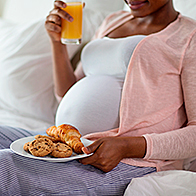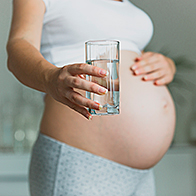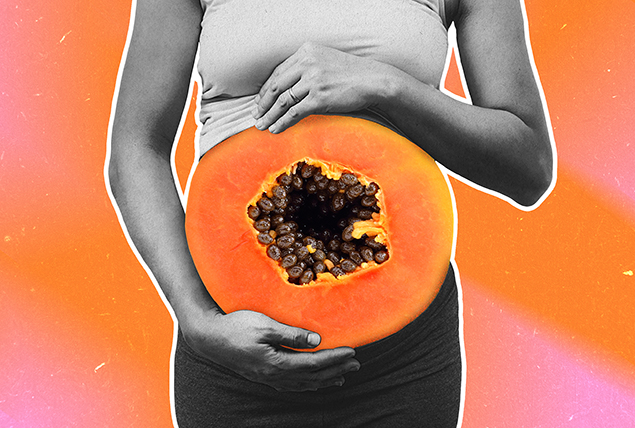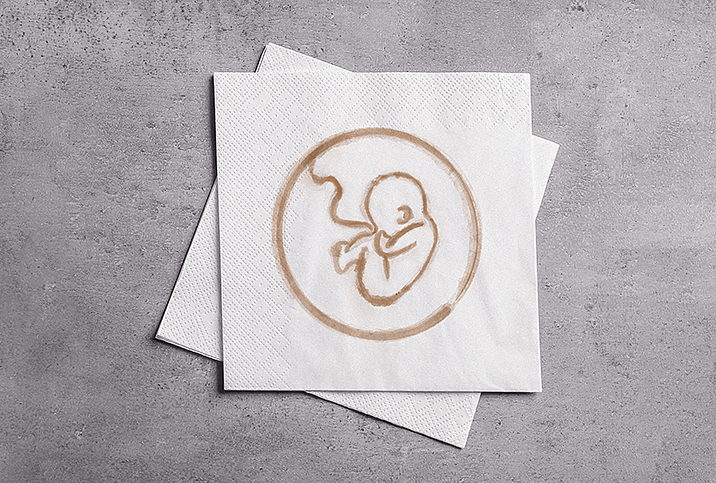Can You Eat Pineapple While Pregnant?
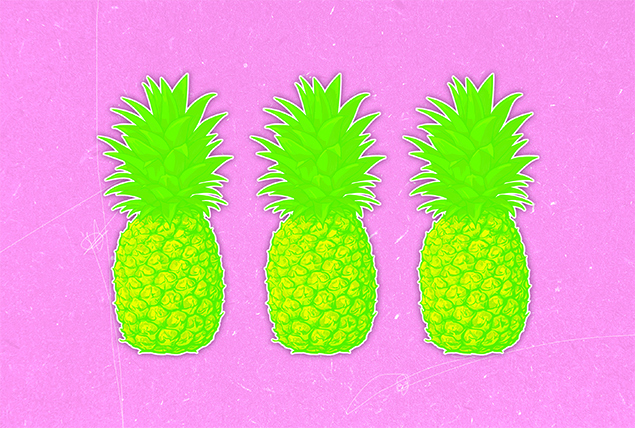
The pineapple: It's tropical, tangy and packed with vitamin C. But could the beloved fruit be the cause of unwanted pregnancy complications?
There is a persistent rumor that eating pineapple can cause a pregnant woman to go into early labor or even miscarry. To dispel this myth, we asked experts the question on the mind of every future mom who is hankering for a smoothie: "Can I eat pineapple while pregnant?"
Is it safe to eat pineapple during pregnancy?
The short answer to whether pineapple is safe for pregnant women is "yes," according to Monte Swarup, M.D., a board-certified OB-GYN in Chandler, Arizona, and founder of Vaginal Health Hub.
"Pineapple is safe to eat when pregnant," Swarup said. "It's rich in antioxidants such as vitamin C."
Of course, if you have had an allergic reaction to pineapple in the past, then no, you shouldn't eat pineapple, pregnant or not.
Do pineapples induce labor or miscarriage?
There is no scientific evidence to suggest eating pineapple induces miscarriage or early labor, Swarup noted.
Siena Lecorps, a nurse practitioner at New Hope Fertility in New York City, agreed with Swarup and explained the origins of the common misconception.
"Pineapples have a high bromelain content, which is an enzyme that softens the cervix and can trigger uterine contraction," Lecorps said.
Large quantities of the enzyme could cause cervix softening, in theory, according to Vita Eizans, D.O., an OB-GYN at Trinity Health Medical Group in the Grand Rapids, Michigan, area. But in reality, the amount of bromelain in pineapple is too low to produce this effect.
"One would need to consume massive amounts of pineapple—as in, several entire fruits—to induce this effect," Eizans said.
You don't need to worry about the enzyme called bromelain as long as you consume pineapple in reasonable amounts. Maybe eat a cup of it instead of the whole thing.
Is pineapple good for pregnant women at the early stage of pregnancy?
Pineapple during pregnancy's first trimester is acceptable—even recommended, according to experts.
"Pineapple is super rich in vitamins and minerals that help support a healthy pregnancy," Lecorps said.
Vitamin B6, folate and manganese are a few of the nutrients found in pineapple, according to Cleveland Clinic.
Is pineapple good for pregnant women at the late stage of pregnancy?
Eating plenty of fruits such as pineapple in the third trimester of pregnancy is safe and even advisable.
"Fruits provide vital vitamins and nutrients," Swarup said.
In addition to fruit, Swarup recommends pregnant people get plenty of vegetables, lean proteins and omega-3 fats during the third trimester and throughout pregnancy.
Do note that pineapple, like oranges or grapefruit, is acidic. It could cause heartburn when consumed on an empty stomach, according to the Surgical Consultants of Northern Virginia. It's worth noting since some pregnant women in their third trimester suffer from heartburn and acid reflux.
Can you drink pineapple juice while pregnant?
Pregnant women can drink pineapple juice without inducing labor or miscarriage, the experts agree. However, since pineapple juice is high in sugar, it's best to drink the beverage sparingly during pregnancy. Blood sugar control is critical for the health of the pregnant person and the fetus.
High sugar intake during pregnancy can increase the odds of pregnancy complications such as preeclampsia and preterm birth, a 2020 study suggested. In addition, prior studies have suggested that a pregnant person's sugar intake can impact a child's brain function.
What does pineapple do for a woman who's pregnant?
Far from being dangerous, pineapples are actually packed with nutritional perks for pregnant people. The health benefits of pineapple include nutrients, immune system support, digestive health support and eye health.
Rich in nutrients
Pineapple is particularly high in vitamin C, which plays a vital role in immune function, collagen synthesis and antioxidant protection. Pineapple also contains manganese, which is important for bone health, metabolism and antioxidant defense.
Immune system support
Pineapple's high vitamin C content can support a healthy immune system. Vitamin C is essential for the production and function of white blood cells, which play a crucial role in defending the body against infections and illnesses.
Digestive health
The bromelain content in pineapple may be too low to soften the cervix, but it's sufficient to possibly support digestive health. Bromelain can promote the breakdown of proteins and enhance nutrient absorption. The enzyme may also help alleviate symptoms of indigestion, reduce bloating and improve overall digestion.
Eye health
Pineapple is a source of beta-carotene, which is converted into vitamin A in the body. Vitamin A is essential for maintaining healthy vision and may help reduce the risk of age-related macular degeneration (AMD) and other eye-related issues.
How often should a pregnant woman eat pineapple?
When it comes to pineapple consumption during pregnancy, as with most things, moderation is key, according to Eizans. Eating too much pineapple is unlikely to induce labor or miscarriage, but it might come with other unwanted side effects.
"Some people may find pineapple triggers heartburn while pregnant, as many acidic foods and fruits do," Eizans said.
Other possible side effects include tongue and mouth irritation.
So what's the perfect amount of pineapple to eat? It depends on your unique body and preferences, but here's a general rule of thumb: One serving of pineapple is one cup of chunks. Adults should eat one and a half to two servings of fruit per day, according to the Centers for Disease Control and Prevention (CDC).
The bottom line
Pineapple in any form—sliced, diced, juiced or whipped into a smoothie—won't cause early labor or miscarriage. If you are allergic to pineapple, then don't eat pineapple.
Too much pineapple, like too much of anything, can have unwanted effects on the body.
"It's important to remember to keep a well-balanced diet and avoid anything in excess," Lecorps said.
If you have concerns about what you can and can't eat, consult your doctor.







